Malcolm R. Campbell's Blog, page 236
October 7, 2011
What reality? What fiction?
 In a humorous post from Golden Eagle called Definitions of Genres: a Comprehensive Guide, we learn that the fantasy genre "comes from people who have a hard time with the separation between reality and fiction, and a fondness for the utterly . . . fantastical."
In a humorous post from Golden Eagle called Definitions of Genres: a Comprehensive Guide, we learn that the fantasy genre "comes from people who have a hard time with the separation between reality and fiction, and a fondness for the utterly . . . fantastical."Seriously, I have to agree. I often wonder, though, where the boundary line between reality and fiction lies. Is it a carefully calculated line such as the boundary between Florida and Georgia. Or is it a bit more flexible like, say, where the ocean ends and the land begins?
The real or imagined uncertainty between reality and fiction is, of course, one of the tools in the fantasy author's cabinet. We really do want the reader to wonder: is this monster real? Or, is it what's making that odd sound outside my bedroom window on this dark and stormy night?
Wondering whether a story just might have happened or might be about to happen keeps readers turning those pages while experiencing the joyfully dissonant feeling that everything that is "out there" might really be inside their thoughts. Or maybe "it" is dancing on the boundary line of reality and fiction and can only be found with intuition and a good imagination.
Meanwhile, thank you for your great post, Golden Eagle.
--Malcolm
You May Also Like:
Breathing in the Land - finding something new through a ritual like hiking a familiar trail over and over.Moon Mysteries: Books for Your Shelf - while writing my contemporary fantasy Sarbande , I found some great resources about the moonExploring the Deep Soul of Man - My review of Mark Winborn's Deep Blues: Human Soundscapes for the Archetypal Journey, a wonderful book for anyone who enjoys listening to the blues.Phenomenon of Portals: Malcolm Campbell's The Sun Singer and Smoky Trudeau's The Cabin - author and psychoanalyst Patricia Damery considers the novelist's use of portals in books by myself and my good friend Smoky Trudeau Zeidel.
Published on October 07, 2011 13:09
October 4, 2011
'Why do you write?' they demanded
Why do you write?
That question is similar to these questions:
Why did you start doing drugs?What were you thinking when you let yourself get knocked up?Why did you back your pickup truck over little Johnny's bike?When you said, "Run, it's the cops," did you think things would be okay?How many times have I told you to do your homework before doing Twitter?
Experience has taught most of us that those who ask such questions are not expecting a rational answer. They want an apology or, perhaps, revenge.
When my mother asked, "Why did you throw a baseball through the bedroom window?" she didn't want to hear a story that made it look like throwing a baseball through a bedroom window was okay. Here's what I did not say:
Mom, I've wanted to throw a baseball through a bedroom window ever since Dad taught me how to throw a fastball. In little league, coach said I had good stuff and that if I put my heart and soul into it, I would one day be able to throw like Nolan Ryan. Breakking this window has been a dream of mine.
The only place a writer can use a story like that about why he or she writes is on a blog tour. The rest of the time, people don't want to hear it. In addition to that apology, they expect the accused writer to be contrite, confess fully, and do penance. When all is said and done, they will say, "Go and write no more."
There is no cure for writing. You take it one day at a time knowing that if you pick up a pencil or open a dictionary, months of abstinence will disappear in a heartbeat. Quitting and staying clean require constant vigilance, and a daily prayer for writer's block.
--Malcolm
That question is similar to these questions:
Why did you start doing drugs?What were you thinking when you let yourself get knocked up?Why did you back your pickup truck over little Johnny's bike?When you said, "Run, it's the cops," did you think things would be okay?How many times have I told you to do your homework before doing Twitter?
Experience has taught most of us that those who ask such questions are not expecting a rational answer. They want an apology or, perhaps, revenge.
When my mother asked, "Why did you throw a baseball through the bedroom window?" she didn't want to hear a story that made it look like throwing a baseball through a bedroom window was okay. Here's what I did not say:
Mom, I've wanted to throw a baseball through a bedroom window ever since Dad taught me how to throw a fastball. In little league, coach said I had good stuff and that if I put my heart and soul into it, I would one day be able to throw like Nolan Ryan. Breakking this window has been a dream of mine.
The only place a writer can use a story like that about why he or she writes is on a blog tour. The rest of the time, people don't want to hear it. In addition to that apology, they expect the accused writer to be contrite, confess fully, and do penance. When all is said and done, they will say, "Go and write no more."
There is no cure for writing. You take it one day at a time knowing that if you pick up a pencil or open a dictionary, months of abstinence will disappear in a heartbeat. Quitting and staying clean require constant vigilance, and a daily prayer for writer's block.
--Malcolm
Published on October 04, 2011 08:16
October 3, 2011
What's your book about?
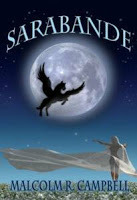 "What's your book about?" is a fair question whether it comes from a prospective reader, interviewer, CIA operative or hit man.
"What's your book about?" is a fair question whether it comes from a prospective reader, interviewer, CIA operative or hit man.But I don't like it.
I want to answer: "Why don't you read the book and then tell me what it's about?"
People take that as sarcasm. But seriously, it isn't. In the realm of psychics, alternative realities, an the imagination, perception is reality. In fact, that's partly what my latest novel Sarabande is about. Is this realm, your expectations impact the experience you will have. In fact, they may even keep you from seeing everything (books, the world, your dreams) in a fresh and creative way.
So, I don't really want to tell you--or anyone else---that Sarabande is about a woman who is accosted on a lonely road at night because that's not the whole story. In fact, when you read the book, you might think that, yes, that happens, but it's not the central thing you took away from the book.
Nonetheless, people tend to feel uncomfortable when they don't know what a book is about. With that in mind, I added a page to my website that tells what I think Sarabande might be about. My thoughts on the matter certainly aren't gospel. Here it is. See what you think.
There's a certain level of comfort in knowing what a book is about. I understand prospective readers' wants and needs in that regard and will do all I can to help. My eyes my glaze over if you ask me directly. I'll fumble through something and hope for the best.
Otherwise, you're on your own recognizance whenever you pick up a copy of Sarabande--or any novel, for that matter. It's supposed to set you free. You can imagine the story anyway you like.
--Malcolm
Published on October 03, 2011 13:43
October 1, 2011
Congratulations to the 'Sarabande' Winners
Howdy,
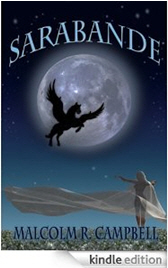 I appreciate the 558 people who entered the GoodReads Giveaway for my concemporary fantasy
Sarabande
. The winners are Heather Moulton, Alison Witiak and Ayushi Sangoi. Hope you enjoy your copy of the novel. The copies are signed, packaged, addressed and ready to go out in Monday morning's mail. If you haven't seen an excerpt from Sarabande yet, I invite you to stop by the novel's listing on Smashwords where reading the first 35% of the story is free.
I appreciate the 558 people who entered the GoodReads Giveaway for my concemporary fantasy
Sarabande
. The winners are Heather Moulton, Alison Witiak and Ayushi Sangoi. Hope you enjoy your copy of the novel. The copies are signed, packaged, addressed and ready to go out in Monday morning's mail. If you haven't seen an excerpt from Sarabande yet, I invite you to stop by the novel's listing on Smashwords where reading the first 35% of the story is free.
Two Vanilla Heart Publishing authors have stopped by my Malcolm's Round Table blog in recent days. L. E. Harvey, author of the recently released Impeccable, contributed a guest post on September 9th called "My Birthday Gift to You." On September 6th, Robert Hays, author of Blood on the Roses contributed "A Writer's Comfort Zone ." Malcolm's Round Table features author interviews, writing tips, book reviews and an occasional editorial about novels and publishing.
If you're on Twitter, I hope you will follow me at MalcolmCampbell . If you're on Facebook, stop by my Malcolm R.Campbell author's page.
Have a great weekend!
Malcolm

 I appreciate the 558 people who entered the GoodReads Giveaway for my concemporary fantasy
Sarabande
. The winners are Heather Moulton, Alison Witiak and Ayushi Sangoi. Hope you enjoy your copy of the novel. The copies are signed, packaged, addressed and ready to go out in Monday morning's mail. If you haven't seen an excerpt from Sarabande yet, I invite you to stop by the novel's listing on Smashwords where reading the first 35% of the story is free.
I appreciate the 558 people who entered the GoodReads Giveaway for my concemporary fantasy
Sarabande
. The winners are Heather Moulton, Alison Witiak and Ayushi Sangoi. Hope you enjoy your copy of the novel. The copies are signed, packaged, addressed and ready to go out in Monday morning's mail. If you haven't seen an excerpt from Sarabande yet, I invite you to stop by the novel's listing on Smashwords where reading the first 35% of the story is free.Two Vanilla Heart Publishing authors have stopped by my Malcolm's Round Table blog in recent days. L. E. Harvey, author of the recently released Impeccable, contributed a guest post on September 9th called "My Birthday Gift to You." On September 6th, Robert Hays, author of Blood on the Roses contributed "A Writer's Comfort Zone ." Malcolm's Round Table features author interviews, writing tips, book reviews and an occasional editorial about novels and publishing.
If you're on Twitter, I hope you will follow me at MalcolmCampbell . If you're on Facebook, stop by my Malcolm R.Campbell author's page.
Have a great weekend!
Malcolm
Published on October 01, 2011 07:35
September 27, 2011
Banned Book Week Reminds Us We Have More Work to Do
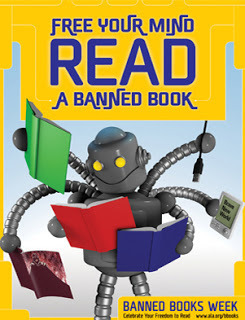 These days, most banned books in the U.S. are those removed from school and public libraries when Person A or Person B doesn't like a book. Those who challenge books are among our weakest links. They believe, I think, that their children are so weak and/or that their parenting skills are so ineffectual that rather than suggesting that BRAVE NEW WORLD (for example) is better left unread for now, they prefer to deprive all of the students in the school of the right to read that book.
These days, most banned books in the U.S. are those removed from school and public libraries when Person A or Person B doesn't like a book. Those who challenge books are among our weakest links. They believe, I think, that their children are so weak and/or that their parenting skills are so ineffectual that rather than suggesting that BRAVE NEW WORLD (for example) is better left unread for now, they prefer to deprive all of the students in the school of the right to read that book.What arrogance. Mrs. Smith or Mr. Jones doesn't want their kids to read, say, the latest Ellen Hopkins young adult novel, so they challenge it. If they succeed, they're also saying they don't want your kids to read "Crank" or "Perfect" either. You had no say in the matter. The gutless people on the school board voted to cave in to the wishes of one person.
Banned Books Week reminds us that Mrs. Smith and Mr. Jones are still out there and that they don't care about you or your family.
Outside the U. S.
Worse yet, of course, is the censorship in other countries. Amnesty International (AI) reminds us during Banned Books Week that the threats to free expression include prison and sometimes death.
Author Nurmemet Yasin, for example, is in prison in China for writing an allegory that officials thought challenged their rule. Isa Saharkhiz, a journalist, is in prison in Iran for criticizing the Ayatollah. And across the border in Mexico, journalist Lydia Cacho Ribeiro is living with death threats because her work has exposed prostitution and the trafficking of women .
I marvel at the risks that writers and others are willing to take in such countries as Singapore, Indonesia, Myanmar, Laos, and Thailand. If you're not a member of AI, the International Campaign for Tibet or a similar organization, you won't hear about most of the torture, imprisonment and deathl. It doesn't make the news. Our media either doesn't care or we don't read deep enough to find the stories.
When it comes to the freedom expression and the right to read, we have more work to do to get ride of the dark ages.
--Malcolm
Malcolm R. Campbell is the author of "Sarabande," a new contemporary fantasy published by Vanilla Heart in August 2011 in trade paperback and e-book editions.
Published on September 27, 2011 13:43
September 23, 2011
Reading into the weekend
I recently finished THE HELP, which I liked (review is here) and have finally started Laura Hillenbrand's well-researched and well-written UNBROKEN. Once again, I'm amazed by the grim World War II battle statistics--men lost, men killed in non-combat plane crashes, the low percentage of men rescued after their planes ditched or crashed in the ocean. Thank goodness, we take a different view of war today.
If you find yourself searching for writers links, you might run across my new blog "Book Bits." It comes out more or less daily with links to book news, contests, interviews and reviews. I see a lot of writing and review links every week anyway, so thought I would started sharing some of them.
As I work on marketing and publicity for my new contemporary fantasy Sarabande , I've been talking (online, mostly) about the reasons I like fantasy. In Sarabande's Journey, I focus on the sense of wonder we feel when we hear beautiful music, see astounding sunsets, and read stories that kindle our imagtinations.
At Malcolm's Round Table, I focus on author Stephen R. Donaldson's viewpoint that most of today's fiction rests on a sense of powerlessness and alienation--with the exception of fantasy. Since my world view is that we are capable of solving the great issues and challenges of the world by primarily transforming ourselves first, I like fantasy for the same reason Donaldson and storyteller Jane Yolen like it. It allows us to see life as it could/should be lived even though the "world out there" tries to tell us otherwise.
Perhaps an all things are possible perspective drew me to read THE HELP. I lived in a white Southern neighborhood that hired black maids during the same era about which Kathryn Stockett's novel is written. Her characters felt powerless to change the status quo. Then, rather than attacking the huge issues of segregation head on, they elected to simply tell their stories. What a beautfiful approach.
That's how many of us as writers find our places in the world. We tell our stories and, while doing so, we transform ourselves in the process.
--Malcolm
If you find yourself searching for writers links, you might run across my new blog "Book Bits." It comes out more or less daily with links to book news, contests, interviews and reviews. I see a lot of writing and review links every week anyway, so thought I would started sharing some of them.
As I work on marketing and publicity for my new contemporary fantasy Sarabande , I've been talking (online, mostly) about the reasons I like fantasy. In Sarabande's Journey, I focus on the sense of wonder we feel when we hear beautiful music, see astounding sunsets, and read stories that kindle our imagtinations.
At Malcolm's Round Table, I focus on author Stephen R. Donaldson's viewpoint that most of today's fiction rests on a sense of powerlessness and alienation--with the exception of fantasy. Since my world view is that we are capable of solving the great issues and challenges of the world by primarily transforming ourselves first, I like fantasy for the same reason Donaldson and storyteller Jane Yolen like it. It allows us to see life as it could/should be lived even though the "world out there" tries to tell us otherwise.
Perhaps an all things are possible perspective drew me to read THE HELP. I lived in a white Southern neighborhood that hired black maids during the same era about which Kathryn Stockett's novel is written. Her characters felt powerless to change the status quo. Then, rather than attacking the huge issues of segregation head on, they elected to simply tell their stories. What a beautfiful approach.
That's how many of us as writers find our places in the world. We tell our stories and, while doing so, we transform ourselves in the process.
--Malcolm
Published on September 23, 2011 19:32
September 18, 2011
Now I can finish 'The Chronicles of Thomas Covenant'
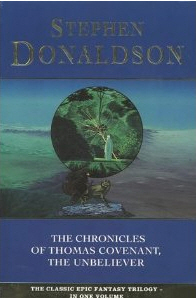 When I began my first novel
The Sun Singer
, I was reading the widely praised, award-winning epic fantasy by Stephen R. Donaldson called
The Chronicles of Thomas Covenant
. I was captivated by it and thought then, as I still do, that it's the best epic fantasy since The Lord of the Rings.
When I began my first novel
The Sun Singer
, I was reading the widely praised, award-winning epic fantasy by Stephen R. Donaldson called
The Chronicles of Thomas Covenant
. I was captivated by it and thought then, as I still do, that it's the best epic fantasy since The Lord of the Rings.But I put the trilogy high up on a dusty bookshelf and skipped the sequel trilogy as well. Now, as the follow-up tetralogy is one book from being complete, I finally going back to Donaldson's epic.
When I began The Sun Singer, I was concerned about being influenced by Donaldson. After all, book critics, reviewers, writing instructors and others warned that writers could be influenced by their favorite books without even knowning it. As I understood the problem, my subconscious would beam Donaldson material into my work while I was asleep.
In my defense, I should mention that for The Sun Singer, I was creating an alternative world named Pyrrha, named after the wife of the Deucalion and Pyrrha flood myth. The Chronicles of Thomas Covenant also features an alternative world as do The Lord of the Rings and J. K. Rowling's Harry Potter series.
By the time I discovered The Sun Singer was evolving as contemporary fantasy rather than epic fantasy, time had passed and I'd fallen so far behind with Donaldson that I never picked it up again. As fantasy fans know, contemporary fantasy features events in our own world and/or in our own world as well as an alternate world, so there was no need to worry about borrowing from another fantasy sub-genre. But I was younger then and had more fears.
Now that my recent contemporary fantasy, Sarabande , has been released, I'm feeling rather at loose ends. I'm not really that addicted to Facebook or Twitter, and while I do watch television on most days, it's fairly restricted. So...what to do?
"Aha," I thought, "I can go back to reading Donaldson." That's almost like a reward for finishing my novel. And, while there may yet be another book after Sarabande, I no longer believe other fantasies will influence what I'm doing. Goodness knows, I saw the epic The Lord of the Rings films and read Rowling's contemporary fantasy series without putting a look-alike Frodo or a look-alike Harry into Sarabande. Perhaps I'm just too set in my ways to subconsciously borrow a bit from Middle Earth or Hogwarts.
Christine Barkley gets it right, I think (with some bias, I know) when she says in the preface of Stephen R. Donaldson and the Modern Epic Vision that "In scope and imagination [Donaldson] rivals J. R. R. Tolkien; in complexity, one might argue, only Shakespeare's Hamlet equals Thomas Covenant." Donaldson is by no means escapist reading, but he is very addictive for anyone with an active imagination. I'm looking forward to many hours of time well spent!
--Malcolm
Published on September 18, 2011 11:11
September 14, 2011
Writers, are we losing our originality?
If you watch many of the shows on the Food Network, you know that while those of us at home cook with A-1 Sauce, Campbell's condensed soups, Hamburger Helper and processed everything, chefs in competition are expected to make meals from scratch. Theoretically, writers are encouraged to do this, too.
The show "Chopped" takes a different approach. It specializes in giving competing chefs odd combinations of strange ingredients which must then be artfully combined into an appetizer, an entre and a desert in timed cooking rushes. The ingredients often include many unregonizable "foods" (like squid ink) that you can't find at your neighborhood Kroger along with many foods that we all know and love such as fig bars, cheese crackers and a variety of cereals displayed in a generic sense so that nobody can scream "product placement."
Chefs competing on "Chopped" quickly learn that ALL of the weird stuff in their baskets of mandatory ingredients must be combined into the meal. Woe be unto the chef who thinks s/he can shake the cheese crackers on top of an entre like croutons or that the squid ink can go into a bowl for dipping or sipping. The word of choice on the show is "re-purposing." This means taking recognizable products and grinding, dicing, and otherwise destroying them to that they are born again out of the ashes of the chefs' new creations.
"Re-purposing" is an interresting concept on "Chopped," especially when most other cooking shows shun the use of any pre-processed food of any kind. As I watch "Chopped," it's clear to me that the producers and directors learned their trade well in college English, Journalism, and Creative Writing courses where the use of pre-processed works (like "A Tree Grows in Brooklyn" or Hemingway's war reporting) was considered plagiarism while disgusing it was considered creative.
In "the old days" teachers had to trudge over to the library when they found unattributed sentences and paragraphs in a student's theme, essay, book report or term paper that sounded oddly familiar--"pre-processed," so to speak. Now colleges have plagarism software that can ferret out copyrighted material in the blink of an eye. Colleges, as I discovered both as a student and an instructor, have long-favored "re-purposing" based on the dogmas that there's nothing new under the sun and that there are only X number of stories out there and they were all written years ago.
Students are encouraged to go to the great canon of novels, non-fiction books, articles and short stories (and now, the Internet) and grind up what they find there and make something new out of it. This is rather pragmatic in a fast-food, low-attention-span world where time is short when it comes to anything from a movie to a novel to a meatloaf out of original ingredients.
If you sprinkle fig bars or triscuits on top of your salad on "Chopped," you will be chopped--that is to say, eliminated from the competition. If you sprinkle slabs of prose wirtten by Betty Smith or Hemingway into your short story or term paper in a college class, you'll also be chopped--that is to say, in most colleges such behavior is an automatic F in the course. Crafty re-purposing is championed with $10,000 on "Chopped" and a magna cum laude graduation from a college writing class or MFA program.
I fear the day will come when no cook or writer will know that original ingredients exist. "You mean, ketchup doesn't come right out of the garden and novels aren't created by combining a cup of blog material, several teaspoons of wikpedia and a dash of Grisham or Gabaldon for seasoning?"
The show "Chopped" takes a different approach. It specializes in giving competing chefs odd combinations of strange ingredients which must then be artfully combined into an appetizer, an entre and a desert in timed cooking rushes. The ingredients often include many unregonizable "foods" (like squid ink) that you can't find at your neighborhood Kroger along with many foods that we all know and love such as fig bars, cheese crackers and a variety of cereals displayed in a generic sense so that nobody can scream "product placement."
Chefs competing on "Chopped" quickly learn that ALL of the weird stuff in their baskets of mandatory ingredients must be combined into the meal. Woe be unto the chef who thinks s/he can shake the cheese crackers on top of an entre like croutons or that the squid ink can go into a bowl for dipping or sipping. The word of choice on the show is "re-purposing." This means taking recognizable products and grinding, dicing, and otherwise destroying them to that they are born again out of the ashes of the chefs' new creations.
"Re-purposing" is an interresting concept on "Chopped," especially when most other cooking shows shun the use of any pre-processed food of any kind. As I watch "Chopped," it's clear to me that the producers and directors learned their trade well in college English, Journalism, and Creative Writing courses where the use of pre-processed works (like "A Tree Grows in Brooklyn" or Hemingway's war reporting) was considered plagiarism while disgusing it was considered creative.
In "the old days" teachers had to trudge over to the library when they found unattributed sentences and paragraphs in a student's theme, essay, book report or term paper that sounded oddly familiar--"pre-processed," so to speak. Now colleges have plagarism software that can ferret out copyrighted material in the blink of an eye. Colleges, as I discovered both as a student and an instructor, have long-favored "re-purposing" based on the dogmas that there's nothing new under the sun and that there are only X number of stories out there and they were all written years ago.
Students are encouraged to go to the great canon of novels, non-fiction books, articles and short stories (and now, the Internet) and grind up what they find there and make something new out of it. This is rather pragmatic in a fast-food, low-attention-span world where time is short when it comes to anything from a movie to a novel to a meatloaf out of original ingredients.
If you sprinkle fig bars or triscuits on top of your salad on "Chopped," you will be chopped--that is to say, eliminated from the competition. If you sprinkle slabs of prose wirtten by Betty Smith or Hemingway into your short story or term paper in a college class, you'll also be chopped--that is to say, in most colleges such behavior is an automatic F in the course. Crafty re-purposing is championed with $10,000 on "Chopped" and a magna cum laude graduation from a college writing class or MFA program.
I fear the day will come when no cook or writer will know that original ingredients exist. "You mean, ketchup doesn't come right out of the garden and novels aren't created by combining a cup of blog material, several teaspoons of wikpedia and a dash of Grisham or Gabaldon for seasoning?"
Published on September 14, 2011 08:36
September 6, 2011
Seeking Stories that Live within Us
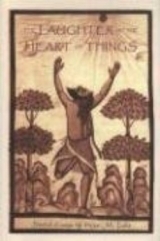 A living myth is told and retold as the centuries pass. Poets, painters, musicians are nourished by its imagery, and in each retelling something is added from the collective attitudes, conscious and unconscious, of the time and from the individual vision of the artist." – Helen M. Luke in "The Laughter at the Heart of things."
A living myth is told and retold as the centuries pass. Poets, painters, musicians are nourished by its imagery, and in each retelling something is added from the collective attitudes, conscious and unconscious, of the time and from the individual vision of the artist." – Helen M. Luke in "The Laughter at the Heart of things."As I read Helen M. Luke's analysis of the myth of the ring as viewed by Richard Wagner in The Ring of the Nibelungen (known as the four-part "Ring Series") and J. R. R. Tolkien's The Lord of the Rings, I was struck by the fact this story is now part of our world view. Whether we learned of the myth through the original source materials, Wagner's musical dramas, Tolkien's books, or the feature film trilogy directed by Peter Jackson, the story lives inside us as though it actually happened.
Tolkien expressed contempt for Wagner's version of the old Norse myth drawn from the 13th century Icelandic Volsung Saga. Yet most critics believe Wagner's The Ring of the Nibelungen (consisting of "Das Rheingold," "Die Walküre" Siegfried, and Götterdämmerung"), composed between 1848 and 1874, and Tolkien's Lord of the Rings, written between 1937 and 1949, are different interpretations of the same myth, and that Tolkien was also influenced by Wagner. Myths often have as many interpretations as history as though they refer to actual events.
Listen to the discussions about J. K. Rowling's Harry Potter books, and you will hear people talking about Harry, Snape, Dumbledore and Voldemort in the same way they speak of celebrities, world leaders and newsmakers who come into their lives television, concerts and the Internet. All of these people, fictional or actual, are larger than life. While novel readers and film audiences know there is a difference between Tolkien's characters and Rowling's characters on one hand and well-known people within our culture, all of them are part of our shared story.
Earlier generations were impacted by Star Trek and Star Wars events and characters just as strongly. We know the difference between fictional characters aren't read and that real people aren't fictional, but it doesn't matter. They're all the same. While even the most fanatical fans don't expect to see Captain Kirk, Spock, Frodo or Hagrid searching for salad greens in the produce department at Kroger or addressing Congress about the state of the galaxy, the worlds of those characters is part of our lives as though it's a living and breathing reality.
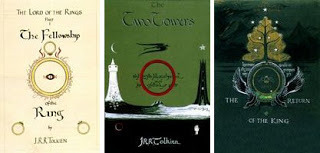 Most authors don't write with the expectation that their stories will impact readers with such force that the characters will suddenly take on independent lives of their own. At best, authors hope their stories and characters will seem real while their books are being read. For a reader, there's nothing better than plunging into a good story, becoming enchanted by it, and following it with the fervor they follow family dramas and the biggest news stories of the day.
Most authors don't write with the expectation that their stories will impact readers with such force that the characters will suddenly take on independent lives of their own. At best, authors hope their stories and characters will seem real while their books are being read. For a reader, there's nothing better than plunging into a good story, becoming enchanted by it, and following it with the fervor they follow family dramas and the biggest news stories of the day.Yet some stories catch our fancy and stay with us long after we put the book down or leave the theater. Those are the stories we seek because they take us on flights of fancy, display new worlds before our mind's eye, and take us on physical and emotional journeys that expand our lives and enrich our imaginations. Ask any reader what his or her favorite books are, and s/he will tell you about good guys and bad guys and things that go bump in the night and awesome landscapes that are just as much a part of his or her life as co-workers, neighbors and family.
As readers, finding such novels is part of a never-ending quest for a real page turner of a story we will never forget because it lives inside us and evolves every time we read it, talk about it and think about it. As readers, we love our living fiction.
-
Many thanks to Pat Bertram for using this essay as a guest post on her blog.
--Malcolm
Published on September 06, 2011 06:11
August 27, 2011
'Sarabande' paperback edition now "live" on Amazon

I'm happy to announce that my new fantasy "Sarabande" was released today in trade paperback. Now, I'm on pins and needles waiting for my author's copies. I have the cover art and the PDF, but it's not the same.
Told from a young woman's point of view, this is fantasy with an edge. My protaonist, Sarabande, undertakes a 1,600 mile journey alone to find the powerful Sun Singer in hopes he will get rid of the ghost who has haunted haunted her for three years. Her journey will take her from the mountains of Montana to the corn and soybean country of central Illinois.
Sarabande is warned that the journey is dangerous. She is told to carry a sharp knife. But on a foggy night in a desolate spot on the Montana plains, the knife isn't enough to help her and Sarabande's world changes forever.
You May Also Like
Sarabande's Journey, "Release Date Nostalgia"
The Write Type, "Sarabande by Malcolm R. Campbell" (a snyopsis and an excerpt)
--Malcolm

Published on August 27, 2011 19:15



